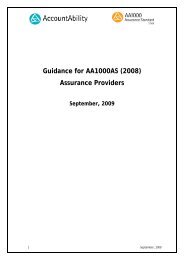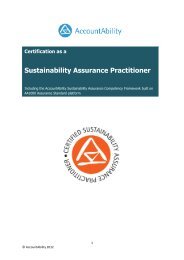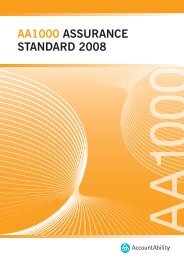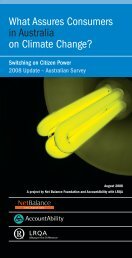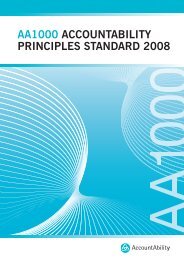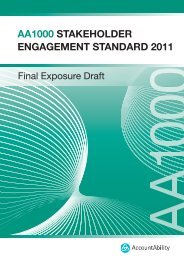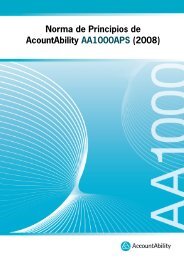The Stakeholder Engagement Manual Volume 2 - AccountAbility
The Stakeholder Engagement Manual Volume 2 - AccountAbility
The Stakeholder Engagement Manual Volume 2 - AccountAbility
Create successful ePaper yourself
Turn your PDF publications into a flip-book with our unique Google optimized e-Paper software.
Areas<br />
Obstacles to Participation<br />
Knowledge / Education/<br />
Communication<br />
Issues Potential Solutions/Enablers<br />
Issue-specifi c knowledge<br />
Ability to use Information and<br />
Communications Technology (ICT)<br />
Literacy<br />
Communication styles<br />
Language<br />
Limited reach of press & media<br />
STAGE 3<br />
Provide timely information<br />
Use different communication channels<br />
(e.g. print - and online media, community<br />
radio, community theatre)<br />
Provide training<br />
Provide information in various languages<br />
‘Open-house’ days<br />
Infrastructure Availability of ICT<br />
Choose accessible locations<br />
Social-Cultural Context<br />
Finances<br />
Means of transport<br />
Unreliable infrastructure<br />
(possibly season specifi c)<br />
Social hierarchies (e.g. caste, gender,<br />
wealth)<br />
Local confl icts<br />
Lack of shared understanding of key<br />
customs<br />
Religion<br />
Culture-specifi c customs &<br />
communication styles<br />
Family and other responsibilities<br />
(e.g. harvest times, childcare)<br />
Costs of travel & accommodation<br />
Lost working-time<br />
Provide assistance with transportation<br />
Provide equipment and training for ICT<br />
if necessary<br />
Choose the right time (e.g. avoiding<br />
monsoon season)<br />
Ensure anonymity if required<br />
Be aware of potential confl icts between<br />
stakeholder groups<br />
Ensure that timing and location of<br />
engagement processes takes into account<br />
stakeholder’s needs.<br />
Location Do stakeholders feel comfortable?<br />
Be sensitive to stakeholder requirements<br />
Can there, if required, be adequate<br />
privacy or anonymity<br />
regarding the locations<br />
Compensate for lost working time<br />
Compensate for travel and<br />
accommodation costs<br />
Some of the key enablers for stakeholders to engage revolve either around<br />
knowledge, access to information, fi nances or time. Th e following guidelines<br />
regarding these areas are very helpful to keep in mind:<br />
• If you do provide fi nancial support to your stakeholders, do this on the basis<br />
of clear eligibility criteria and in a transparent manner.<br />
• Never lightly assume common levels of knowledge and similar understandings<br />
of concepts – be sure everybody involved understands the issues at stake.<br />
• Provide enough time: <strong>Stakeholder</strong>s – just like the company – require time<br />
for digesting information, understanding and forming opinions amongst<br />
themselves. Good engagement also requires trust, which takes time to evolve.<br />
• Don’t just make stakeholders learn about your way of thinking –<br />
make sure you understand how they see things, too!<br />
THE PRACTITIONER'S HANDBOOK ON STAKEHOLDER ENGAGEMENT | 91



